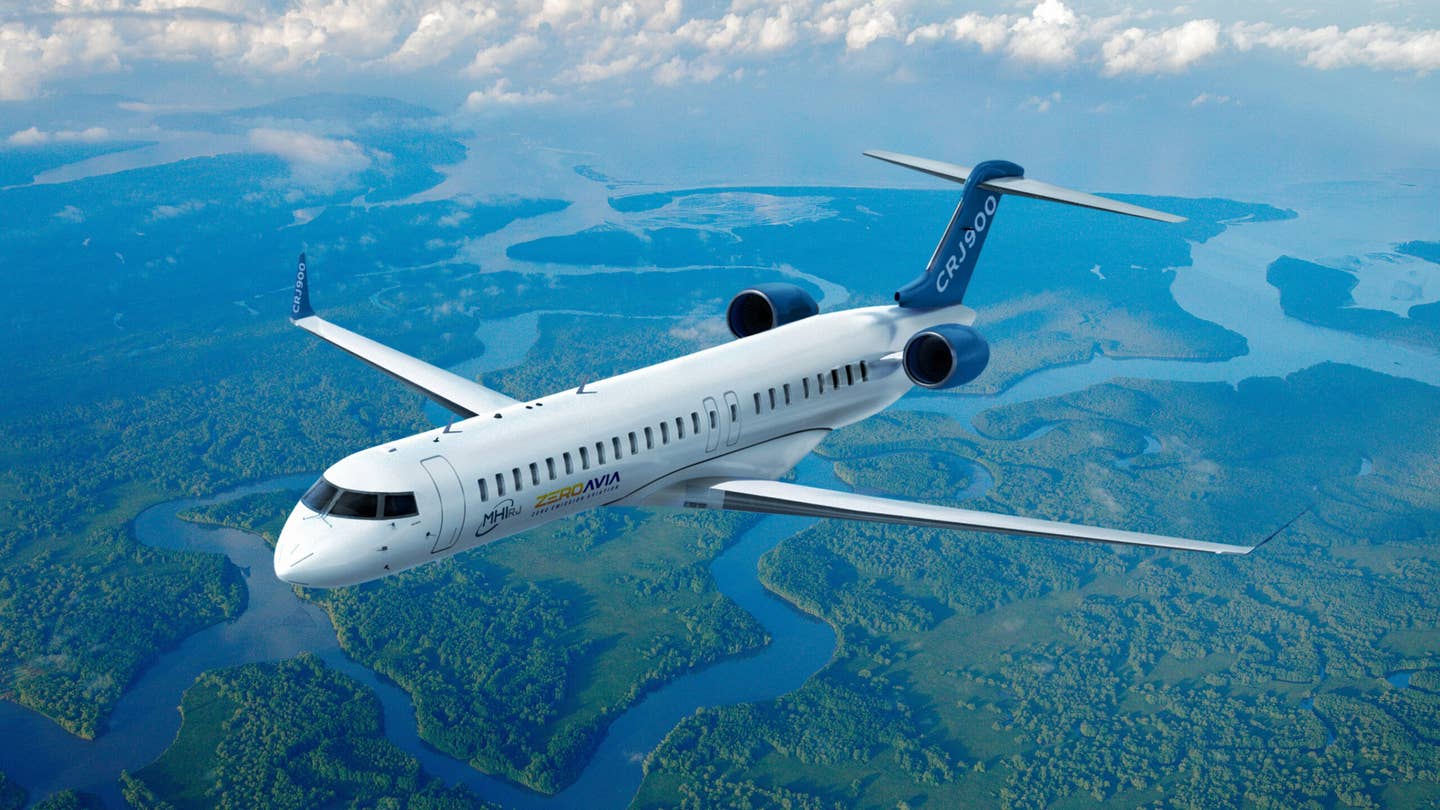ZeroAvia to Retrofit CRJ Series Regional Jets with Hydrogen-Electric Powertrains
U.K.-based ZeroAvia on Wednesday announced an expanded agreement with Mitsubishi’s Canada-based MHI RJ Aviation Group (MHIRJ) aimed at retrofitting CRJ Series aircraft with zero-emission, hydrogen-electric powertrains.

ZeroAvia says all flights by CRJ Series aircraft “should be zero-emission well before the end of this decade.” [Courtesy: ZeroAvia]
In a move described as a “giant step forward” toward developing hydrogen-electric regional jets, U.K.-based ZeroAvia on Wednesday announced an expanded agreement with Mitsubishi’s (OTC US: MHVYF) Canada-based MHI RJ Aviation Group (MHIRJ) aimed at retrofitting CRJ Series aircraft with zero-emissions powertrains.
As part of the collaboration, MHIRJ will provide engineering services, data, and certification support relevant to the CRJ700, enabling ZeroAvia to optimize its hydrogen-electric powertrain to retrofit the airframe.
The deal makes the CRJ Series, which marked its first delivery—a Canadair CRJ100—in 1992, as a “frontrunner for the earliest operations using true zero-emission engines,” said Val Miftakhov, ZeroAvia’s founder and CEO, in a statement. “This agreement is a giant step forward in delivering hydrogen-electric engines to the regional jet segment."
In the 30 years since the first Canadair CRJ, the series has grown to become a workhorse, with more than 1,020 built thus far. Bombardier acquired the assets of Canadair in 1987, including the development work on the series.
"There are hundreds of CRJ-series aircraft in daily operation across North America, transporting millions of passengers,” he said. “All these flights can and should be zero-emission well before the end of this decade.”
The agreement represents a first for MHIRJ's Aerospace Engineering Centre (AEC) in the hydrogen propulsion field. It comes two years after Mitsubishi Heavy Industries formally acquired the CRJ Series Program from Bombardier.
For ZeroAvia, this undertaking is just the latest of several significant partnerships aimed at developing hydrogen-electric propulsion systems for existing regional aircraft.
United Airlines and Alaska Air
Last year, United Airlines (NASDAQ: UAL) and Alaska Air Group (NYSE: ALK) joined ZeroAvia to accelerate development of its powertrains.
United Airlines plans to buy as many as 100 ZA2000-RJ engines from ZeroAvia.
The partnership with Alaska Air calls for ZeroAvia to develop an experimental hydrogen-electric powertrain system for a de Havilland DHC-8-400—aka Q400—twin-engine turboprop.
The push toward zero-emissions powertrains is being driven by venture capital investments as well as commitments from major airlines and governments to achieve net-zero carbon emissions by 2050. Civil aviation accounts for roughly 2 percent of global CO2 emissions.
Hydrogen Fuel Cells Versus Hydrogen Combustion
ZeroAvia’s announcement represents the latest attempt to explore the possibilities of hydrogen-powered flight.
Hydrogen-electric powertrains are powered by hydrogen fuel cells that produce electricity without combustion or emissions, similar to conventional batteries. However, unlike car batteries, they don’t run down or need to be recharged as long as they’re fed hydrogen and oxygen.
Airbus is planning to experiment with a different technology fueled by hydrogen: a direct combustion turbine engine. Last February, Airbus, Safran, and GE Aviation announced a program to test a hydrogen combustion engine using an A380 airliner as a test platform.

Subscribe to Our Newsletter
Get the latest FLYING stories delivered directly to your inbox






